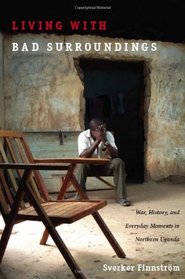Search -
Living with Bad Surroundings: War, History, and Everyday Moments in Northern Uganda (The Cultures and Practice of Violence)
Living with Bad Surroundings War History and Everyday Moments in Northern Uganda - The Cultures and Practice of Violence
Author:
Since 1986, the Acholi people of northern Uganda have lived in the crossfire of a violent civil war, with the Lord’s Resistance Army and other groups fighting the Ugandan government. Acholi have been murdered, maimed, and driven into displacement. Thousands of children have been abducted and forced to fight. Many observers have perceived A... more »
Author:
Since 1986, the Acholi people of northern Uganda have lived in the crossfire of a violent civil war, with the Lord’s Resistance Army and other groups fighting the Ugandan government. Acholi have been murdered, maimed, and driven into displacement. Thousands of children have been abducted and forced to fight. Many observers have perceived A... more »
ISBN-13: 9780822341918
ISBN-10: 0822341913
Publication Date: 3/30/2008
Pages: 304
Rating: ?
ISBN-10: 0822341913
Publication Date: 3/30/2008
Pages: 304
Rating: ?
0 stars, based on 0 rating
Publisher: Duke University Press
Book Type: Paperback
Members Wishing: 0
Reviews: Amazon | Write a Review
Book Type: Paperback
Members Wishing: 0
Reviews: Amazon | Write a Review
Genres:
- History >> Africa >> General
- History >> Africa >> Uganda
- Nonfiction >> Social Sciences >> Anthropology >> Cultural
- Nonfiction >> Social Sciences >> Anthropology >> General
- Nonfiction >> Social Sciences >> General
- Nonfiction >> Social Sciences >> Sociology >> General




